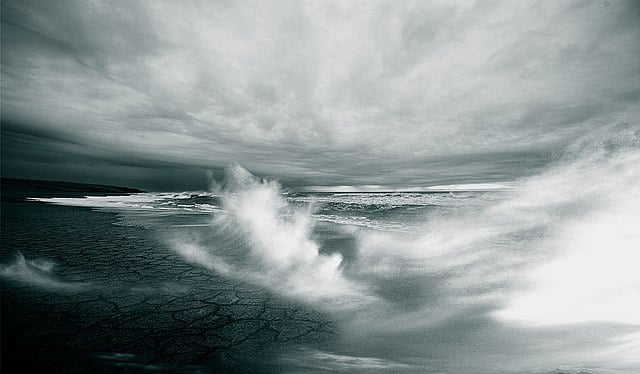Scientists have published a new study suggesting that a crucial system of Atlantic Ocean currents that influences the weather around the world could collapse by the 2030s.
Studies published over the last few years show that Atlantic Meridional Overturning Circulation, or AMOC, could collapse due to warmer ocean temperatures.
The study, titled “Probability Estimates of a 21st Century AMOC Collapse,” shows that the estimated time frame for the collapse of Atlantic Ocean Currents is likely between 2037 to 2064.
But why is AMOC so influential on Earth’s weather?
Atlantic Meridional Overturning Circulation works as a planetary distribution system. AMOC pulls warm surface water from the southern hemisphere and then distributes it to the North Atlantic Ocean.
In essence, AMOC prevents parts of the Southern Hemisphere from overheating and the Northern Hemisphere from reaching frigid temperatures.
If the Atlantic Ocean currents were to collapse, the world would change radically
Experts say that after a hypothetical collapse of the Atlantic Ocean currents, ice from the Arctic would stream down south, eventually covering the southern coast of England.
Temperatures on the planet will also change dramatically. Europe’s and North America’s average temperature would also collapse.
The Amazon rainforest would likewise suffer unrecognizable changes, given that if the Atlantic Ocean currents collapsed, the seasons in the rainforest would flip.
This means the current dry season would become rainy, and damage would be irreversible.
Scientists identified an area of the ocean to monitor
To conduct their study, scientists from Utrecht in the Netherlands relied on revolutionary methods that would allow them to monitor an area in the South Atlantic Ocean.
Scientists will monitor for any changes in circulation and use observational data so as to identify Atlantic Ocean temperatures and ocean saltiness. The particular study has yet to be peer-reviewed, meaning others in the scientific community have yet to evaluate the study’s methodology and conclusions.
However, this does not make the study any less relevant. Stefan Rahmstorf, a physical oceanographer at Potsdam University in Germany, spoke to CNN and explained that “there are now five papers that [have] suggested [the currents could collapse…] in this century, or even before the middle of the century.”
The scientist also maintained that we have a 50 percent chance of the Atlantic Ocean currents collapsing during this century. However, with our current technology, scientists are not able to factor in melting Greenland ice, a crucial factor, to their models.
This is pertinent given that there are massive amounts of freshwater streaming into the North Atlantic, disrupting salt circulation in the ocean.



